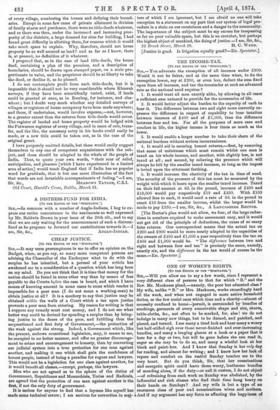CHEAP JUSTICE.
ero THE EDITOR OF THE "SPECTATOR.") SIR,—It may seem presumptuous in me to offer an opinion on the Budget, when, as you say, so many more competent persons are advising the Chancellor of the Exchequer what to do with the surplus he has inherited, but a perusal of your article has awakened me to a consideration of a question which has long been on my mind. Do you not think that it is time that money for the nation should be found in some other way than by means of fees payable to the Courts before the case is heard, and which I have means of knowing amount in some cases to sums which render it impossible for a poor man (I do not mean a working-man) to obtain justice at all ? It is a mockery to say that justice may be obtained within the walls of a Court which a tax upon justice prevents a poor man from entering. My reason for writing is that
I suppose any remedy must cost money, and I do not see what better way could be devised for spending a surplus than by bring- ing justice to the doors of the poor, and fulfilling thus the unquestioned and first duty of Government,—the protection of the weak against the strong. Indeed, a Government which, like the present, eschews sensational legislation, may, it seems to me, be occupied in no better manner, and offer no greater discourage- ment to crime and encouragement to honesty, than by converting our judicial system into a true protection for one man against another, and making it one which shall gain the confidence of honest people, instead of being a paradise for rogues and lawyers. This would not be a legislation for one class against another, for it would benefit all classes,—except, perhaps, the lawyers.
Men who are not agreed as to the sphere of the duties of Government, Republicans and Monarchists, Tories and Radicals, are agreed that the protection of one man against another is the first, if not the only duty of government.
It is useless for anyone to find that a layman like myself has made some technical errors ; I am anxious for correction in mat-
ters of which I am ignorant, but I am afraid no one will take exception to a statement on my part that our system of legal pro- cedure is a stain on our escutcheon and a danger to the community. The importance of the subject must be my excuse for trespassing so far on your valuable space, but this is no crotchet, but perhaps the highest object of mankind, the doing of justice.—I am, Sir, &c.,
22 Brook Street, March 28. H. C. WEBB. [Justice is good. Is litigation equally good?—En. Spectator.]


































 Previous page
Previous page